
The Nymphalidae are the largest family of butterflies, with more than 6,000 species distributed throughout most of the world. Belonging to the superfamily Papilionoidea, they are usually medium-sized to large butterflies. Most species have a reduced pair of forelegs and many hold their colourful wings flat when resting. They are also called brush-footed butterflies or four-footed butterflies, because they are known to stand on only four legs while the other two are curled up; in some species, these forelegs have a brush-like set of hairs, which gives this family its other common name. Many species are brightly coloured and include popular species such as the emperors, monarch butterfly, admirals, tortoiseshells, and fritillaries. However, the under wings are, in contrast, often dull and in some species look remarkably like dead leaves, or are much paler, producing a cryptic effect that helps the butterflies blend into their surroundings.

The morpho butterflies comprise many species of Neotropical butterfly under the genus Morpho. This genus includes more than 29 accepted species and 147 accepted subspecies, found mostly in South America, Mexico, and Central America. Morpho wingspans range from 7.5 cm (3.0 in) for M. rhodopteron to 20 cm (7.9 in) for M. hecuba, the imposing sunset morpho. The name morpho, meaning "changed" or "modified", is also an epithet. Blue morphos are severely threatened by the deforestation of tropical forests and habitat fragmentation. Humans provide a direct threat to this spectacular creature because their beauty attracts artists and collectors from all over the globe who wish to capture and display them. Aside from humans, birds like the jacamar and flycatcher are the adult butterfly’s natural predators.

The Menelaus blue morpho is one of thirty species of butterfly in the subfamily Morphinae. Its wingspan is approximately 12 cm (4.7"), and its dorsal forewings and hindwings are a bright, iridescent blue edged with black, while the ventral surfaces are brown. Its iridescent wings are an area of interest in research because of their unique microstructure. Due to its characteristic blue color, Morpho menelaus is considered valuable among collectors and was widely hunted in the 20th century.

Morpho hecuba, the sunset morpho, is a Neotropical butterfly and the largest species in the genus Morpho. Its wingspan can reach 20 centimetres (7.9 in), but is usually from 13–15 centimetres (5.1–5.9 in). "M. hecuba is the largest known Morpho and one may also call it the most interesting, on account of its habits, its susceptibility to climatic influences and its tendency to develop polychromatic forms in both sexes."
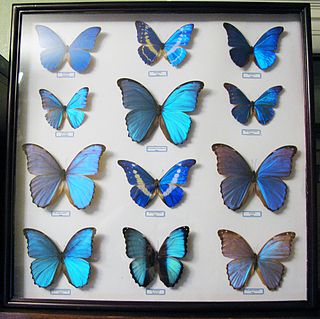
The Morphinae are a subfamily of Nymphalidae butterflies that includes the morphos, the owl butterflies (Caligo), and related lineages. It is either considered a sister group of the Satyrinae, or disassembled and included therein.
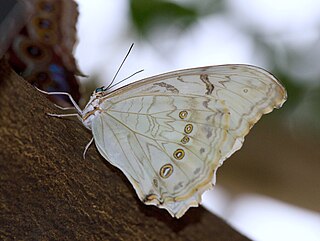
Morpho polyphemus, the white morpho or Polyphemus white morpho, is a white butterfly of Mexico and Central America, ranging as far south as Costa Rica. As suggested by its name, this is one of the relatively few Morphos that is white rather than blue. Some authorities include M. luna, which is also white, as a subspecies of M. polyphemus.
Blue morpho may refer to several species of distinctly blue butterfly under the genus Morpho, including:

Morpho peleides, the Peleides blue morpho, common morpho or the emperor is an iridescent tropical butterfly found in Mexico, Central America, northern South America, Paraguay and Trinidad. Most authorities believe that peleides is a subspecies of Morpho helenor.
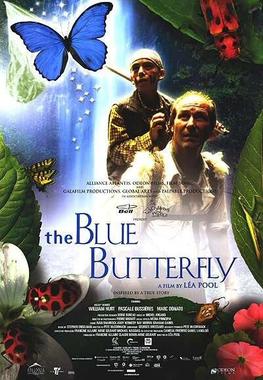
The Blue Butterfly is a 2004 Canadian biographical adventure drama film, directed by Léa Pool, produced by Porchlight Entertainment and Alliance Atlantis, distributed by Monterey Media and starring Marc Donato as Pete Carlton, a boy terminally ill with cancer, whose final wish is to find the elusive blue morpho butterfly. William Hurt plays entomologist Alan Osborne, who takes him to the jungles of Costa Rica to find the insect.

Eugène Le Moult was a French naturalist and entomologist specialised in butterflies; hunter, businessman and collector.

Morpho achilles, the Achilles morpho, blue-banded morpho, or banded blue morpho, is a Neotropical butterfly.
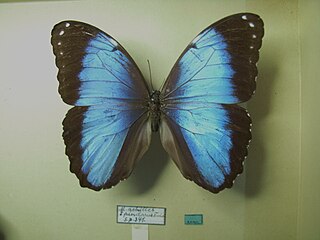
Morpho helenor, the Helenor blue morpho or common blue morpho, is a Neotropical butterfly found throughout Central and South America from Mexico to Argentina. It is a species group that may or may not be several species. Many subspecies have been described.

Morpho sulkowskyi, or Sulkowsky's morpho, is a Neotropical butterfly. It is found in Colombia, Ecuador and Peru.

Morpho adonis, the Adonis morpho, is a Neotropical butterfly. It is found in Venezuela, Suriname, French Guiana, Colombia, Ecuador, Brazil, and Peru. The wingspan ranges from 70 to 90 millimetres.

Morpho rhetenor, the Rhetenor blue morpho, is a Neotropical butterfly of the family Nymphalidae. It is found in Suriname, French Guiana, Brazil, Peru, Ecuador, Colombia, and Venezuela.

Morpho amathonte is a Neotropical butterfly belonging to the subfamily Morphinae of the family Nymphalidae. It is considered, by some authors, to be a subspecies of Morpho menelaus.

Morpho helena, the Helena morpho, is a Neotropical butterfly of the family Nymphalidae. It is found in the rainforests of northern South America.

Morpho godarti, or Godart's morpho, is a Neotropical butterfly found in Peru and Bolivia.

Morpho didius, the giant blue morpho, is a Neotropical butterfly belonging to the subfamily Morphinae of family Nymphalidae. It is considered, by some authors, to be a subspecies of Morpho menelaus.
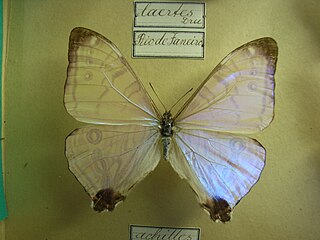
Morpho laertes, the White morpho or Epistrophus white morpho, is a Neotropical butterfly found in Brazil, Uruguay, Paraguay, and Argentina. The white morpho is native to the Atlantic Forest, where they are distributed throughout a landscape of multiple species.


















